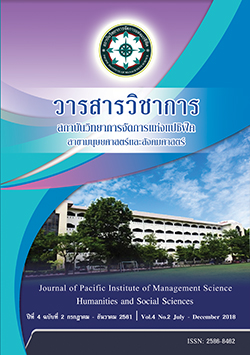The Way Toward Self - Employment Careers of Home Economics Graduates Vocational College
Keywords:
Self - Employment Careers, Home EconomicAbstract
The purposes of this research were to study 1. The way of independent career of home economics graduates. 2. The management system and how to operate an independent career of home economics graduates. 3. Barriers to independent occupation of home economics graduates Vocational College.
The tool was qualitative research conducted in in-depth interviews with independent professionals who provide information selected by home economics graduates. Vocational colleges Department of Food and Nutrition General house Clothing and Apparel at least 5 years of independent career through interview and observation. During the interview It will use taped recording during the conversation, taking notes and observing behaviors. Data analysis Content Analysis
The results of the study found that those who graduated from home economics The 15 vocational colleges include 13 new starters and 2 family businesses. There are two reasons for choosing a business: (1) Personal needs To do what love and aptitude. Potential and ability of entrepreneurs, experience and age (2) External factors include income, opportunity and competition. Business and family potential. The management system and operation method are the same front-end owners who have found 4 operations: (1) Marketing (2) Financial (3) Production (4) Personnel the problems and obstacles found are high competition. Current economic uncertainty and home economics graduates who are self-employed do not have enough marketing knowledge. Financial problems include: Not being systematically accountable for operating manufacturing problems are problems of quality personnel in producing goods or services, resulting in ineffective products or services that meet the needs. Conclusions and Criticism: The findings will guide or guide the career pathway in home economics. Of those who graduated in home economics. Vocational colleges
References
นนทลี พรธาดาวิทย์. (2545). วิถีคหกรรมศาสตร์ในประเทศไทย: บทสะท้อนวิสัยทัศน์และกระบวนทัศน์จากปัจจุบันสู่อนาคต. ดุษฎีนิพนธ์ ภาควิชาอาชีวศึกษา บัณฑิตวิทยาลัยมหาวิทยาลัยเกษตรศาสตร์.
ประเชิญ ครูไพศาล. (2537). วิชาชีพคหกรรมศาสตร์. กรุงเทพฯ: อมรการพิมพ์.
พรชัย บัวเกิด. (2537). ค่านิยมของผู้ประสบความสำเร็จในอาชีพอิสระ. วารสารการวิจัยทางการศึกษา.
มณี โกสุมาศ. (2540). พฤติกรรมการสอนคหกรรมศาสตร์. กรุงเทพฯ: ฝ่ายเอกสารและตำรา สถาบันราชภัฏ สวนดุสิต.
สำนักงานคณะกรรมการการศึกษาแห่งชาติ. (2544). แนวทางการปฏิรูปการศึกษาระดับอุดมศึกษา. กรุงเทพฯ: ห้างหุ้นส่วนจำกัด วี.ที.ซี.คอมมิวนิเคชั่น.
สำนักงานคณะกรรมการการอาชีวศึกษา. (2558). ฐานข้อมูลนักศึกษา. กรมอาชีวศึกษา.
สุรนาท ขมะณะรงค์. (2548). การบริหารการพัฒนาอุตสาหกรรมชนบท. ขอนแก่น: คณะมนุษยศาสตร์และสังคมศาสตร์ มหาวิทยาลัยขอนแก่น.
Boemer, KathleenH. (1992). Wastewater management and resource recovery intensive rural industries Australia. Division of Water Resource, Camberra Australia, 26 (2), pp.201-208.
Galinno, Jose. (2002). And FSQLto the management of rural accommodation. Tourism Management,23(6), pp.623-629.
Nhantumbo, I. (2001). Goal programming: Application in the management of the Miombo Woodland in Mozambique. European Journal of Operation research, 133 (2), pp. 310-322.
Samuel, P.S. (1995). Economic development and rural industry in Korea and Taiwan. World Development, 10(11), pp.973-990.
Downloads
Published
Issue
Section
License
บทความที่ได้รับการตีพิมพ์เป็นลิขสิทธิ์ของ สถาบันวิทยาการจัดการแห่งแปซิฟิค
ข้อความที่ปรากฏในบทความแต่ละเรื่องในวารสารวิชาการเล่มนี้เป็นความคิดเห็นส่วนตัวของผู้เขียนแต่ละท่านไม่เกี่ยวข้องกับสถาบันวิทยาการจัดการแห่งแปซิฟิค และคณาจารย์ท่านอื่นๆในสถาบันฯ แต่อย่างใด ความรับผิดชอบองค์ประกอบทั้งหมดของบทความแต่ละเรื่องเป็นของผู้เขียนแต่ละท่าน หากมีความผิดพลาดใดๆ ผู้เขียนแต่ละท่านจะรับผิดชอบบทความของตนเองแต่ผู้เดียว







